Shiny, happy Wall Street
A much worse-than-expected drop in first-quarter GDP just isn't enough to derail the market's momentum. But are investors getting too giddy?


 |
| The broader market is still down for the year. But it's up during President's Obama's first 100 days in office thanks to an explosive surge since early March. But can the rally last? |
NEW YORK (CNNMoney.com) -- It would have been hard to imagine a few months ago that the market would cheer a report showing the economy declined at a more than 6% annual pace in the first quarter.
But that's exactly what happened Wednesday on the heels of the first quarter gross domestic product report. All three major market barometers shot up about 2% in early afternoon trading. Welcome to the shinier, happier Wall Street.
The S&P 500 (SPX) is inching back close to 900, a level it hasn't hit since before Inauguration Day. The index has surged nearly 30% from its lows in early March and is now down less than 4% for the year.
So is this recent market rally really a legitimate sign that the worst is over?
Investors' giddy reaction to a report that didn't exactly do a great job of justifying recent hopes that the recession is getting less severe - GDP fell at an annual pace of 6.1% in the first quarter, compared with a 6.3% fourth-quarter drop - is yet another example of how quickly sentiment has shifted in the market.
"There have been a decent dose of economic indicators showing signs of stability lately. This rally looks healthier than other bear market rallies preceding this," said Liz Ann Sonders, chief investment strategist with Charles Schwab & Co.
It wasn't that long ago that every piece of economic data, every earnings report and every new initiative by the Treasury Department or Federal Reserve was viewed through a glass darkly. It was verboten to suggest that the economy might actually be close to stabilizing. We were heading for Great Depression 2.0!
But since early March, the mood of the market has taken a 180 degree turn. Bad earnings reports are considered good because they weren't as awful as investors expected them to be.
And instead of focusing on how terrible economic data is, people are instead choosing to look at the bright side of the reports, namely numbers that suggest the economy may now just be falling in slow-motion as opposed to its precipitous plunge in the immediate aftermath of Lehman Brother's collapse.
"Things in the present may not be as bad as they have been. And that's important because that's how all recoveries start," said Jonathan Adams, an adjunct professor of finance at the NYU School of Continuing and Professional Studies.
"The surge in stocks since the beginning of March is telling you investors are wiling to put money on the side of an improving economy rather than an eroding economy," he added.
To be fair, the first-quarter GDP report did have two significant pieces of good news in it: Consumer spending rose 2.2% in the quarter, and a big chunk of the GDP decline was driven by a plunge in business inventories.
Companies have taken drastic steps to cut inventories to adjust for the downturn, which hurts the economy in the short-term. But if consumers really are starting to grow more willing to spend a little more freely again, corporations will likely need to ramp up their inventories again.
"The silver lining is that the collapse in inventories is unlikely to be repeated in the coming quarters," wrote economists with Barclays Capital in a report Wednesday.
So there could be an inventory "accelerator effect" going forward that could help to minimize declines in the second quarter and possibly even contribute to growth later in the year.
With that in mind, the Barclays economists are predicting only a 2% decline in GDP in the second quarter and added that "by the second half of the year...the economy can crawl out of this recession provided the recovery in consumption persists."
But not everyone is sold on the notion that the economy and stock market have hit bottom. The fact that stocks have shot up so dramatically in such a short period of time remains a concern to some experts.
"The rally may soon run out of fuel. Investors have grown too callous to bad macroeconomic news," said Dan Cook, senior market analyst with IG Markets, a futures commission merchant in Chicago. "There is all this talk about green shoots. But green shoots indicate growth. All we've seen is a slowdown in the decline."
Cook is worried that the market won't like the results of the bank stress tests, which regulators are expected to reveal next week. Adams conceded that the stress tests are also "puzzling." He thinks it will be difficult for banks to raise capital themselves if the government asks them to do so.
"Private investors would not want to put money into an institution that the government has flagged as one that needs to go out and raise more capital," he said. "I'm not sure the stress test was well thought out as a step to provide confidence or build capital. And if it can't do those things I don't understand what it's all about."
Cook is also skeptical that the plan to have the government partner with investors to buy up toxic assets from banks, the Public-Private Partnership Investment Program, or PPIP, will work as well as hoped.
"One big thing on my mind is PPIP. To me, it kind of looks like the government has stepped over themselves. There is still a lot to fix," he said.
Whether or not more investors start to share Cook's concerns in the next few weeks remains to be seen. But for now at least, it still looks like the market is willing to turn a blind eye to bad news.
Want a Money Makeover? E-mail us at makeover@moneymail.com. For the CNNMoney.com Comment Policy, click here. ![]()

